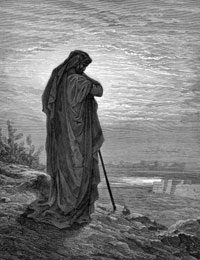 I have been thinking lately of the prophet Zechariah. I return to this older brother from time to time. Zechariah was a servant of mission, filled with passion and conviction, vision and power. His passion and vision encourage me.
I have been thinking lately of the prophet Zechariah. I return to this older brother from time to time. Zechariah was a servant of mission, filled with passion and conviction, vision and power. His passion and vision encourage me.
Zechariah appears on the scene 519 years before the birth of Christ. Some twenty years earlier, in 539 approximately, the people of Israel had returned to Jerusalem following a long and difficult sojourn in Babylon. For sixty years the people of Israel had been captive in Babylon – since Nebuchadnezzar had torn down the Temple, destroyed Jerusalem and led the people away in bondage. It was not a happy time. But in 539 the people of Israel were released from captivity. Many returned immediately to Jerusalem, full of vision and enthusiasm. They were called again to the mission of God in the earth. And they knew it! They returned to Jerusalem to rebuild the Temple, restore the city, and take up their role in the wonderful cause of the King of kings.
But twenty years is a long time – and in the course of it, the people of Israel lost their way. The vision for mission that thrilled them in 539 now faded. The enthusiasm that filled their thinking and imaginations became dull. And their role in the wonderful cause of the King? By 519, they had forgotten what the story itself was all about.
Over the summer I read a book by John Eldredge that describes, I think, the existential funk that overcame Israel upon their return from Babylon. It is a funk that overcomes moderns from time to time, too.
We find ourselves in the middle of a story that is sometimes wonderful, sometimes awful, often a confusing mixture of both, and we haven’t a clue how to make sense of it all. It’s like we’re holding in our hands some pages torn out of a book. These pages are the days of our lives. Fragments of a story. They seem important, or at least we long to know they are, but what does it all mean? If only we could find the book that contains the rest of the story. (Epic, by John Eldredge, p.8; Nashville: Nelson Books, 2004.)
Maybe it was the years of captivity (and long accommodation) in Babylon. Maybe it was the pressing challenge of rebuilding their own homes and livelihoods, once back in Jerusalem. Whatever the case, by the time Zechariah appears on the scene the people of Israel are “pages torn out of a book.” They have lost the line of the story. There are snippets – but the larger drama has faded from view. So the temple remains in ruins and the city, for the most part, unbuilt – twenty years after they returned from Babylon with promise and enthusiasm and began its reconstruction. Their “role in the wonderful cause” has become a distant memory.
Then comes Zechariah. The book that bears his name is a beautiful mixture of visions, narrative and preaching. The first seven chapters contain a heady series of eight visions. They appear to have occupied the prophet’s mind during a single visionary night in February in the year 519. We find mighty angels, horsemen and chariots, flying scrolls and shining lampposts. And in the very middle comes the powerful, organizing theme of God’s mission in the world: “Not by might, nor by strength, but by my Spirit, says the Lord of hosts” (4:6).
In the next few months I want to tell you about these visions. They are visions that tell the larger story, in a way. They are a prophecy that roots the “pages torn out of a book” into a larger whole.